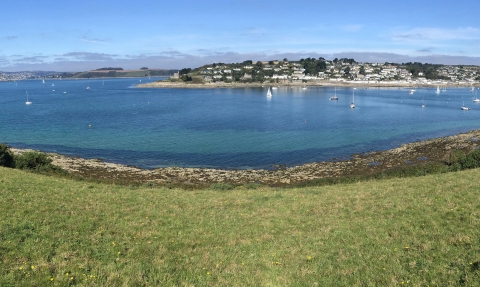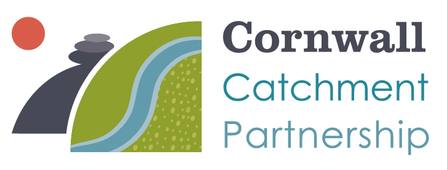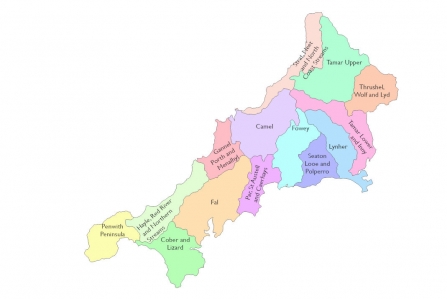
Cornwall Catchment Partnership
Improving water resources throughout Cornwall for people and wildlife
About
Cornwall Catchment Partnership (CCP) was established in 2014 with the aim to improve the water resources throughout Cornwall. As part of the national Catchment Based Approach movement, we bring together local people, communities, organisations and businesses to make decisions on managing the streams, rivers, and lakes of Cornwall.
Our multi-partner approach enables delivery of the Defra 25 year Environment Plan, Cornwall’s Environmental Growth Strategy, and moves Cornwall towards climate resilient catchments, places, and a long term sustainable future.

Our catchments
Cornwall is a unique place characterised by an extensive range of natural features, including sandy beaches, estuaries, moorland, pastureland, and an extensive network of streams and rivers. The topography of Cornwall is such that there are over 300 different water bodies, all of which, due to their proximity to the sea, have an influence on the marine environment. These 300 waterbodies have been clustered (see map) by The Environment Agency into thirteen operational catchments to help focus the management efforts of the Catchment Partnership . Ten of these water bodies fall within the Cornwall Catchment Partnership’s domain, the three on the border with Tamar Catchment Partnership. Both partnerships have a close working relationship.

Our focus
The Catchment Partnership recognises the diversity of Cornwall’s water bodies. Rather than targeting individual sites, the Partnership seeks to develop and apply universal principals for dispersed and widespread catchment improvements. The Partnership therefore works strategically across themes:
- Soils
- Forest for Cornwall
- Connected Habitats
- Connected Communities
- Integrated into the Local Nature Recovery Plan and Nature Recovery Networks
What can you do to help your local water environment?
- Install water butts or rain gardens - particularly if your drains run into a sewer to reduce pressure on the sewage system during heavy rainfall, which may otherwise contribute towards storm overflows spilling sewage.
- Only flush the 3Ps (poo, pee, paper) down the toilet. Wet wipes (even ‘flushable’ ones), cotton buds and sanitary products can all create blockages contributing to sewage spills.
- Think about what you put down the drains. Chemicals may harm aquatic wildlife and fats/oils contribute towards fatbergs forming, which may block sewage systems and cause spills.
- Swap garden pesticides like Roundup for less harmful options or use gardening practices like companion planting or sacrificial planting.
- Buy food from farmers with environmental and nature-friendly practices such as pesticide reduction and good soil management.
- Buy and use less plastic products and synthetic materials to reduce plastics and microplastics entering our water courses and join local litter picks, Clean Cornwall activities or Plastic Free Communities events.
- Report pollution incidents to the Environment Agency by calling the pollution hotline on 0800 80 70 60. You can also report muddy floods to Cornwall Council online.
- Swap out pesticide-based flea treatments on pets. Flea treatments like fipronil and imidacloprid are potent neurotoxic insecticides and when pet owners wash their hands/bedding or allow pets to swim in rivers these harm fish and aquatic invertebrates.
- Get to know your local river! Find out how healthy your river is by checking the Environment Agency’s Catchment Data Explorer website and take part in citizen science river monitoring schemes like Riverfly, Westcountry Rivers Trust’s CSI project or the Big River Watch.
Cornwall Catchment Partnership Members
Improving the water resources in Cornwall requires coordination and collaboration with our partners:
- Cornwall Beaver Project
- Cornwall Council
- Cornwall Community Flood Forum
- Cornwall Groundwater Partnership
- Cornwall National Landscape
- Cornwall Wildlife Trust
- Country Land and Business Association
- Duchy of Cornwall
- Environment Agency
- Farming and Wildlife Advisory Group South West
- Forestry Commission
- Imerys
- National Farmers Union
- National Highways
- National Trust
- Natural England
- South West Lakes Trust
- South West Water
- Tamar Catchment Partnership
- Westcountry Rivers Trust
- University of Exeter
Contact
To contact the Cornwall Catchment Partnership Officer, Jade Neville, please email jade.neville@cornwallwildlifetrust.org.uk






